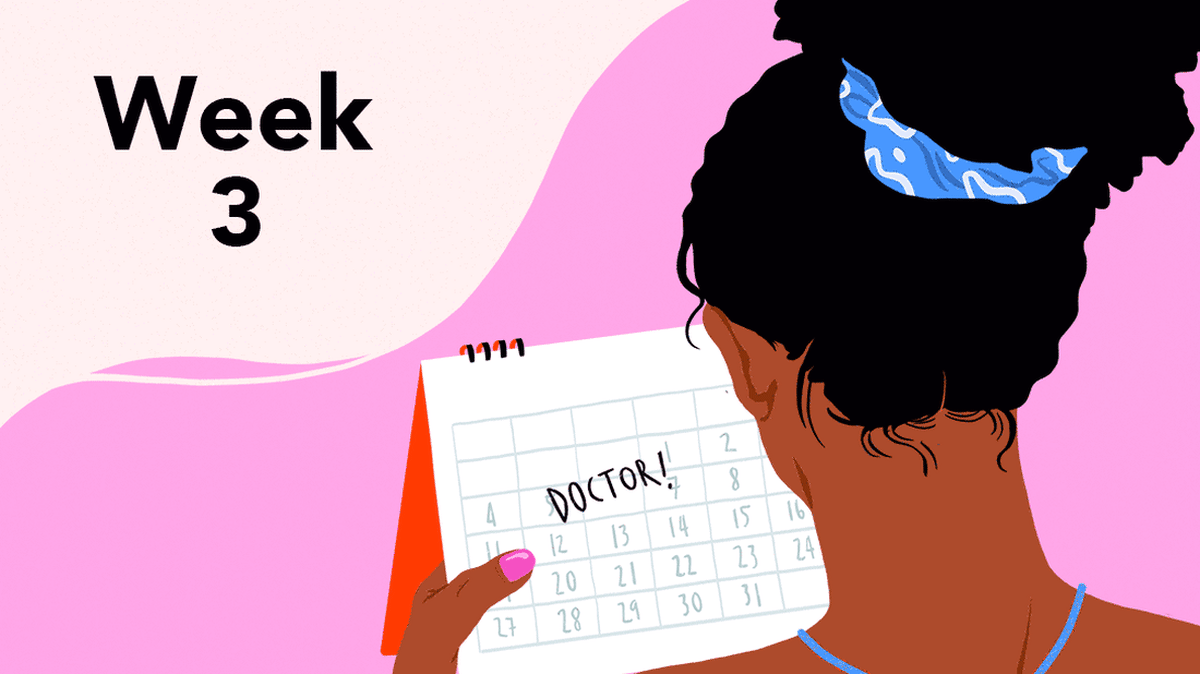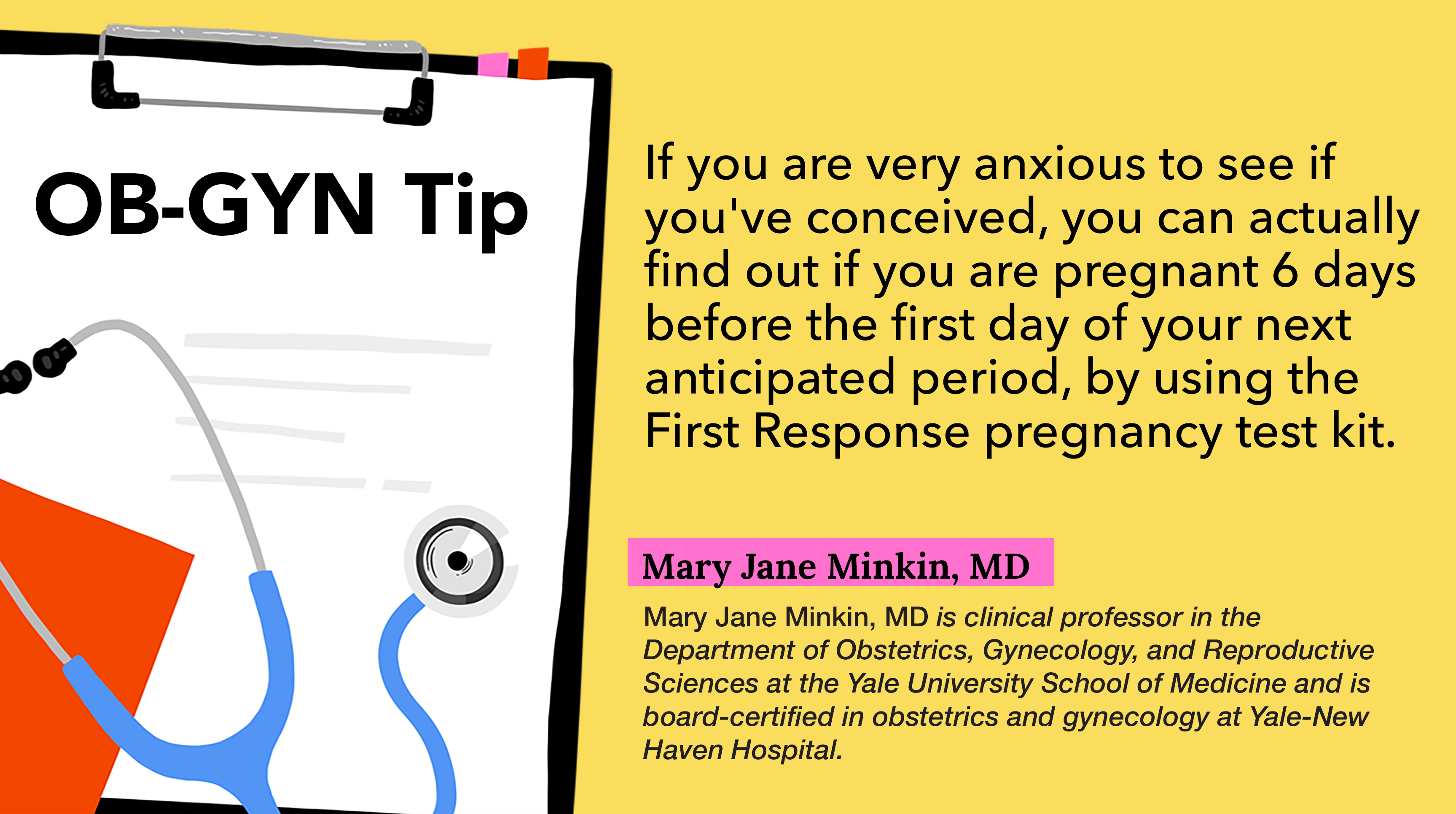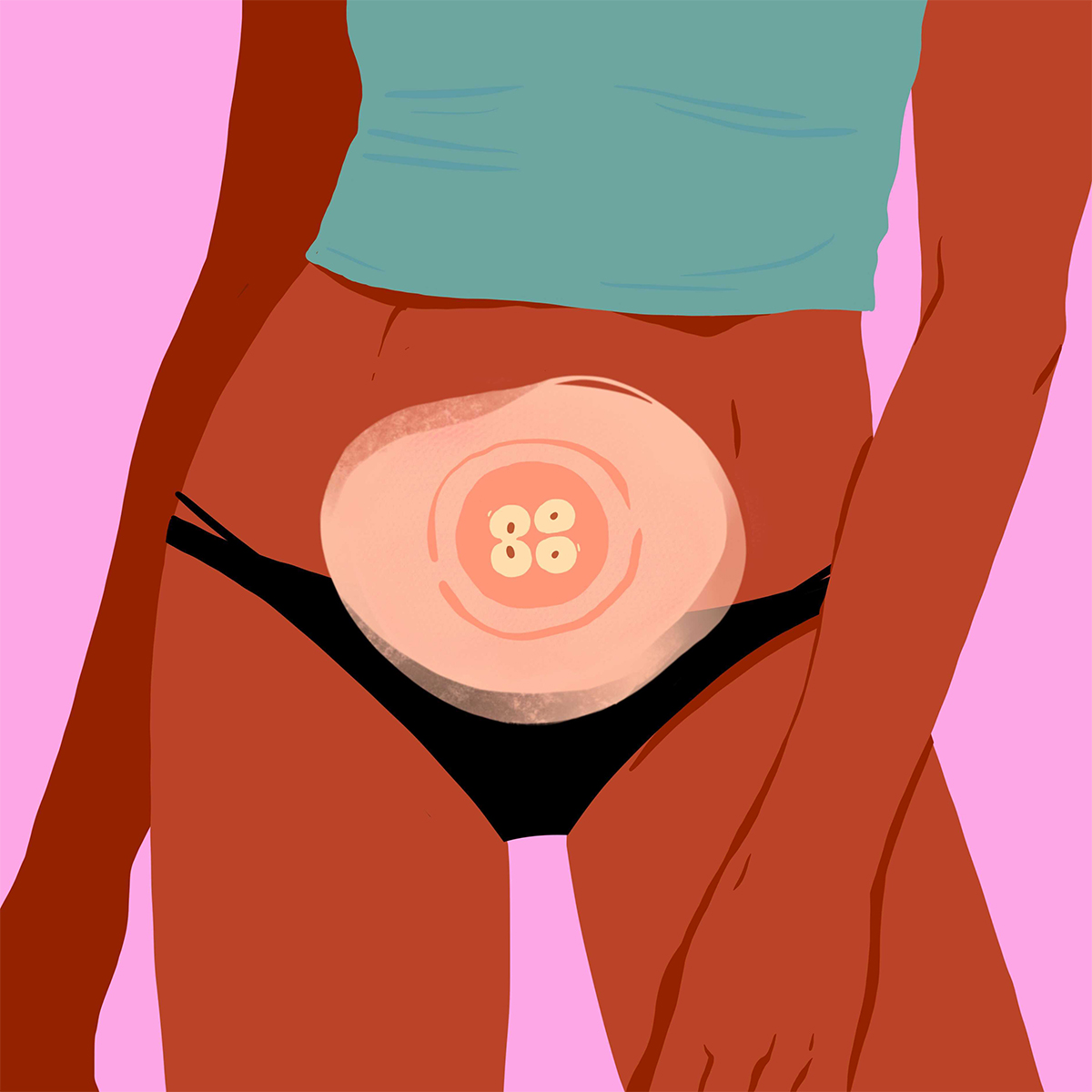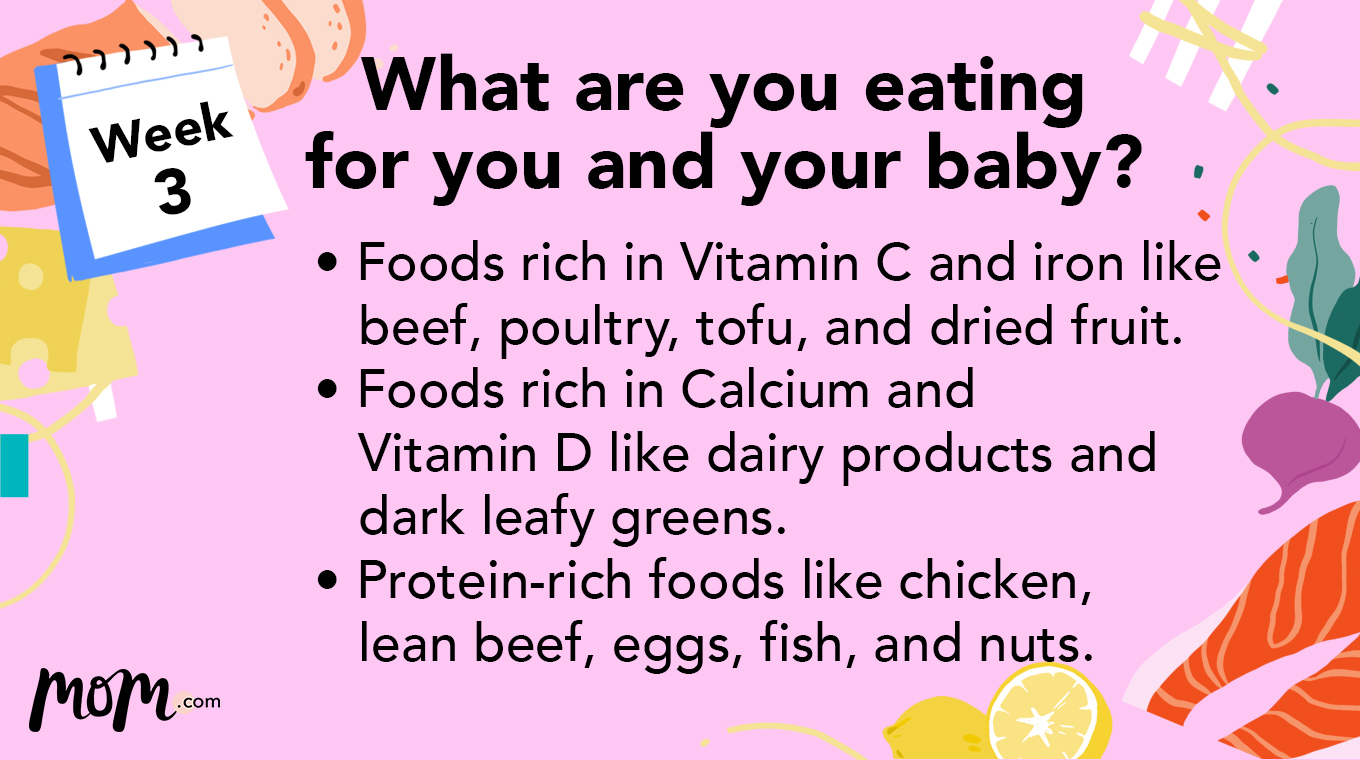
In this article
You’re 3 weeks pregnant!
Congratulations! It’s your first week of actually being pregnant and the earliest you can get a positive pregnancy test. Usually, the most sensitive pregnancy test can be taken 6 days before the first day of your expected period. If you are pregnant, the hormone human chorionic gonadotropin (HCG) is likely still very low, so make sure to use your first-morning urine because it will contain the highest amounts of HCG.
If you test negative, it could be because you are still too early in the pregnancy to make detectable amounts of HCG. Though that is likely very frustrating, you can try to take a pregnancy test a few days later to see if you’re pregnant.

Pregnancy symptoms at 3 weeks
Does not really feeling pregnant have you wondering how you’re supposed to feel at 3 weeks pregnant? Not to worry. “Most expecting mothers won’t notice much difference during this first month of pregnancy. In fact, many women may not even know that they are pregnant if they aren’t keeping track of their cycles,” notes Kelly Kasper, MD, Obstetrics & Gynecology at Indiana University Health.
Still, pregnancy hormones, released soon after conception, can create side effects that some moms-to-be find harder to miss. Early signs of pregnancy that you may notice include:
- Breast tingling and tenderness
- Fatigue
- Increased urination
- Bloating and cramping
- Light spotting as the embryo implants itself in your uterus
- Morning sickness (nausea and/or vomiting)
- Basal body temperature stays high
Unfortunately, a lot of the symptoms of pregnancy at 3 weeks overlap with PMS and menstrual symptoms — so sometimes, it can be very difficult to tell if you’re pregnant or just about to get your period. Though that can be very frustrating and nerve-wracking, remember that you can take a pregnancy test as early as 6 days before your anticipated period.
Your ultrasound
Typically, at 3 weeks pregnant, you would not get an ultrasound because most obstetrical exams and visits for pregnancy are scheduled at about 8 to 10 weeks gestation. “When you are a week late, you sometimes can see a bit in the uterus on a transvaginal ultrasound,” ob-gyn Dr. Mary Jane Minkin told Mom.com, “but it’s better to get a look when you are two weeks late, when you really can start seeing something definitive.”
Your pregnant belly at 3 weeks

Aw, what a sweet little ball of cells! Once the magical moment of conception takes place, the fertilized egg begins to rapidly divide as it travels from the fallopian tube (where conception typically occurs) to the uterus. At the end of this 3.25-inch journey, the embryo burrows into the uterine wall. If you have identical (monozygotic) twins or triplets, the zygote will usually split between 2 to 6 days. The entire process — from conception to implantation — takes about 10 days.
After implantation? More magic happens as cells attached to the uterine wall begin to form the placenta, the organ responsible for providing your baby with nourishment. Other cells develop into the umbilical cord, the pipeline between the placenta and your baby, as well as the amniotic sac, the fluid-filled membrane that provides the baby with a cushion of protection until delivery.
As for the main attraction — your baby — its brain and spine will have already begun to develop by the time you notice that your period is late (around week 4 after the first day of your LMP, or approximately 14 days after conception).
Pregnancy tips at 3 weeks
To kick off 9 months of excellent prenatal care, make an appointment this month with your ob-gyn or midwife for testing to confirm your pregnancy and to talk about the road ahead. “It’s good to schedule out your regular prenatal care visits at this time too,” notes ob-gyn Dr. Lizellen La Follette.
Some women also feel as if they have a constant metallic taste in their mouth. It’s totally normal and a side effect of all the hormones coursing through your body. To get rid of that taste, you can try sucking on sour candies, drinking acidic things like lemonade or other citrus juices, or eating foods dipped or marinated in vinegar. You can also try brushing your tongue with a toothbrush or gargling salt water. As annoying as this can be, that metallic taste will most likely disappear by your second trimester.
Your pregnancy checklist at 3 weeks
This week, make sure you get a pregnancy test to confirm whether you’re pregnant, and if you are, call ahead to your ob-gyn to make your first in-person appointment. Otherwise, your checklist is pretty similar to the previous weeks by doing the following:
- Quit smoking, drinking alcohol, and/or taking drugs
- Stop (or significantly cut down) consuming excessive caffeine (e.g., more than five cups of caffeine a day)
- Check with your doctor about which medications or supplements are safe to use during pregnancy
- Consult with your doctor to see if you should get any vaccines, such as for the flu, COVID-19, or whooping cough (T-dap) to protect yourself and your baby
Another thing you may want to consider stopping is coloring your hair — at least during the first trimester. Experts generally agree that it’s better not to risk the chemicals involved in the hair coloring process, and if you do head back to the salon, to ask for processes that don’t touch your scalp or are ammonia-free and less harsh. Thanks to the hormones in your body, your hair can also react differently than it did before and affect the coloring process, so make sure you do a strand test.
What are you eating for you and your baby?

Now that you are the sole source of nutrients for your fetus, you need to make sure you eat healthily and supplement any vitamins you’re missing from your diet. Don’t forget to take a prenatal vitamin (you can buy over-the-counter ones or take ones that are recommended or sometimes prescribed by your doctor).
Here are some nutrients you need to up in your diet now that your baby is dependent on you for their growth and development:
Vitamin C and iron
Because your blood volume has increased due to the baby, you will need more iron in your diet. Other than from slow-release pills (try to opt for slow-release versions in order to prevent constipation), you can try iron-rich foods like beef, poultry, soy products like tofu, and dried fruit. To help your body absorb that iron, you’ll also need vitamin C. Foods you can eat that are high in vitamin C are fruits like kiwis, strawberries, tomatoes, and asparagus.
Calcium and vitamin D
Your baby is going to need calcium to grow strong bones as well as a healthy heart, nerves, and muscles. If you don’t eat calcium-rich foods or supplements, your body will take the calcium from somewhere — usually by leaching calcium from your bones and teeth. Some foods high in calcium include dairy products, dark leafy greens like spinach and kale, almonds, and lentils.
Vitamin D also helps your body absorb calcium, so make sure your supplements also include it — as well as the foods you eat, like salmon, egg yolks, and herring or sardines. Without vitamin D, your body only absorbs 10% to 15% of calcium from your diet.
Lots of fluids
When you’re pregnant, you will need to increase your fluid intake, because your body is making amniotic fluid, blood, tissue, enhancing digestion, and carrying a lot of nutrients to your baby. Plus, if you’re feeling nauseated, drinking fluids (perhaps with some ginger tea) or a drink with electrolytes like Gatorade to help replenish your fluids and ease your stomach.
Protein
To help tissue growth and development as well as the making of antibodies, hormones, and enzymes, you’ll need to eat three servings of protein a day. You can eat skinless chicken, lean beef, eggs, fish, dairy, nuts, or legumes.
When to call your doctor
Please call your doctor if you have lower abdominal pain (usually on one side of the body) paired with bleeding that is dark and watery as well as either heavier, lighter, or longer than your regular period — this could be a sign of ectopic pregnancy. An ectopic pregnancy is when the fertilized egg implants itself outside the uterus — usually a fallopian tube.
While most symptoms of ectopic pregnancy aren’t obvious until about 6 to 8 weeks of pregnancy, some other early signs of an ectopic pregnancy are:
- Back pain
- Bowel and bladder problems (e.g., diarrhea, pain while pooping or peeing)
- A feeling of fullness when lying down — not the kind of fullness after eating — and especially if you have already had a child
It’s also possible to have an ectopic pregnancy with no symptoms until the fallopian tube or close organ has ruptured. The signs for that are:
- Vaginal bleeding (light to heavy)
- Sharp waves of pain in abdomen, pelvis, neck, or shoulder
- Fainting or dizziness
- Rectal pressure
According to the Centers for Disease Control and Prevention (CDC), pregnant people are at a higher risk of severe illness from COVID-19 and death compared to non-pregnant people. Furthermore, pregnant women with COVID-19 are at increased risk of delivering a baby before 37 weeks (preterm birth) and other adverse ramifications.
Note: If you are visiting a medical professional during COVID, make sure to ask about the facility’s safety measures and confirm that they are following COVID protocols as indicated by the CDC.
Additional considerations
According to a 2008 Lucile Packard Children’s Hospital and the School of Medicine study, if you are part of an Asian-white couple, the risk of gestational diabetes is higher than a white couple — though not as high as if you are in an Asian couple. Furthermore, in an Asian female and white male couple, you are at higher risk for a caesarean section due in part to larger babies. If you are Asian or part of an Asian-white couple, make sure you discuss the increased risks and possible preventions with your health care provider.






